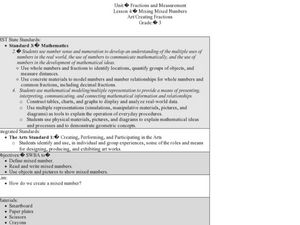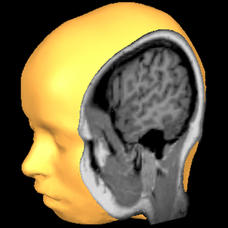Curated OER
Egg Hunt Lesson
Fourth graders explore religious holidays by participating in an egg hunt. In this Easter lesson, 4th graders review the different U.S. states and capitols before completing a geography egg hunt activity. Students read geographic clues...
UNICEF
What is Voluntary Counselling and Testing?
A lesson about counseling through the HIV testing process brings up important facts about HIV, how patients can decide to test for the virus, and what makes a positive or negative test. It includes a flowchart that takes learners through...
Central Bucks School District
Igneous Rocks Lab
Searching for a simple igneous rocks experiment to assist pupils with rock classification based on texture and composition? In the activity, pupils view multiple rocks in various ways to determine texture and composition. They then...
Children’s Hospital of Philadelphia
Case Studies: Influenza and HIV
Stop infection spread. Pupils participate in an activity to model infections and replications of viruses. Within the activity, scholars see that viruses may end up with genetic variation and connect that to how some forms of the flu are...
Curated OER
Viral Hijackers
Students discover how viruses effect living organisms. Focusing on HIV, they explain why it is unique and how it attacks the immune system. They simulate the spread of viruses through an experiment using water containing sodium...
Curated OER
Coming of Age with H.I.V.
Students explore and examine some of the issues facing HIV positive teenagers. They research the lives of HIV positive teenagers.
Curated OER
Tracking a Virus
Learners simulate the spread of a virus such as HIV through a population by "sharing" (but not drinking) the water in a plastic cup with several classmates. Although invisible, the water in a few of the cups will already be tainted with...
Curated OER
How HIV Infects Cells
For this how HIV infects cells worksheet, learners read the given information about how HIV infects cells. Students explain the role of various structures in HIV infection. Learners design a drug that might slow the rate of cellular...
Curated OER
Mixing Mixed Numbers Art/Creating Fractions
Third graders explore number values by participating in class math activities. For this fractions lesson, 3rd graders collaborate with classmates to discuss the technique of adding mix numbers while utilizing paper plates to help...
Curated OER
How Do I know That a Book Is Just Right for Me to Read?
Students choose a book for reading. In this language arts lesson, students take steps to evaluate a book for free reading. Students make a list of words found in the book that they are unfamiliar with.
Pennsylvania Department of Education
Equal Groups
Students explore statistics by completing a graphing activity. In this data analysis lesson, students define a list of mathematical vocabulary terms before unpacking a box of raisins. Students utilize the raisins to plot data on a line...
National Endowment for the Humanities
George Washington: The Precedent President
Everyone knows that George Washington was the first president, but do your scholars know why that was so important? The lesson plan, the third in a sequence of three, allows learners to understand how George Washington set a precedent...
National Endowment for the Humanities
How to Win a World War
High schoolers are have begun to learn the art of diplomacy with each other, but do they understand how diplomacy works at a global level? The second in a series of four lessons, guides scholars in evaluating primary sources. The why...
National Endowment for the Humanities
The New Order for "Greater East Asia"
Sometimes the New Order becomes synonymous with its implications for European countries, but what about its consequences for East Asia? The final instructional activity in a four-part series teaches scholars about World War II. High...
Curated OER
First-Day-of-School Activity: The Kissing Hand
Looking for an interactive back to school activity? Start by reading the book The Kissing Hand, and having your class discuss their feelings about the first day of school. They trace their hand onto paper, cut out the paper hand, paint a...
National Endowment for the Humanities
Women's Lives Before the Civil War
Women's lifestyles before the Civil War made a huge impact as a point of causation. Give middle schoolers the opportunity to view firsthand the lives of women before the Civil War. They analyze primary source documents, view photographs,...
Curated OER
The Lion, the Witch and the Wardrobe: Problematic Situation
Accompany The Lion, the Witch, and the Wardrobe by C.S. Lewis with this activity worksheet. Spark a discussion about the story's characters' decision making skills while making inferences and allow learners to connect personally by...
Teach Engineering
The Fibonacci Sequence and Robots
What better way to introduce the idea of a sequence than with robots! An educational lesson explains the classic Fibonacci sequence before pupils build and program a robot to move. Additionally, the lesson challenges individuals to...
Starry Night Education
Comets and Meteors
Comets are also known as dirty snowballs or icy mud balls. With your super scientists, create a model comet nucleus to discover how they are made and take part in a scientific discussion to learn how it behaves.
Rainer Goebel
Brain Tutor 3D
The human brain is staggeringly complex, and its structure can seem impossible to grasp. This user-friendly app allows for exploration of the brain's anatomy, providing nomenclature, 3-D mapping, and functions.
National Research Center for Career and Technical Education
Transportation, Distribution, and Logistics: Tire and Wheel Assemblies
Is bigger really better? By the end of this lesson, learners will be able to apply formulas for computing the diameter of tires and wheel assemblies. Begin by showing a slide presentation that will review definitions for radius and...
Museum of Science
Virtual Heart
No more beating the pavement to find a virtual model of the human heart. See one in continual real-time motion, and layer it to highlight electrical impulses, blood flow, and valve activity.
Baylor College
How Do We Use Water?
Send youngsters home to survey how they use water in their homes. Then bring them together to discuss which uses are essential for our health and which are not. A helpful video offers teaching tips for this lesson, and a presentation...
Scholastic
Study Jams! Fossil Fuels
Eight slides introduce viewers to the wonders and woes of fossil fuels. How are they formed? How do we use them? How do they harm the environment? And how can we conserve? All of these thoughts are briefly touched upon. In addition to...
Other popular searches
- Hiv Aids
- Graphic Aids
- Hiv/aids
- Hiv Aids Research Papers
- Hiv Aids Hands On
- Hiv Aids Lab Phenolphthalein
- Aids Epidemic
- Hiv Aids Lesson Plans
- Aids Public Health
- Hiv Aids Lab
- Aids and African Americans
- Hiv Aids Fun

























